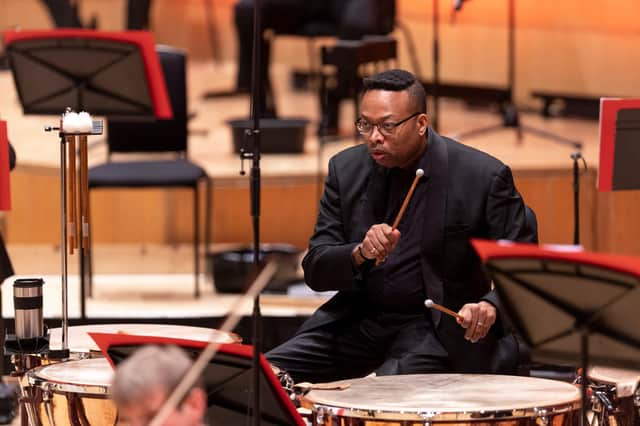Paul Philbert: 'Stirring the pot isn’t always comfortable, but it offers opportunities'


Two orchestras sharing the stage at the same time: it’s not something you often encounter, understandably. But when the Royal Scottish National Orchestra and BBC Scottish Symphony Orchestra (or at least musicians from both ensembles) cram themselves together in Glasgow’s Royal Concert Hall next week, it’ll serve a dual purpose. Not only will it send a message about collaboration and cooperation between groups you might normally expect to be in competition, bit is will also create the gargantuan ensemble needed for one of the 20th century’s most exuberant showpieces: John Adams’s Harmonielehre.
“It’s an absolutely glorious piece,” says Paul Philbert, RSNO Principal Timpanist. “I get goosebumps just thinking about it coming up.” It’s a remarkable mix of minimalist energy and Wagner- or Mahler-style Romantic richness that really put the California-based composer on the map in the 1980s. “I’m a bit scared about the very end, though,” Philbert admits. “It’s incessant, and very loud. Because of Covid I’ve not been doing a lot of particularly muscular, vigorous playing. I’ll need to get back into the pool and give my arms a decent workout in the run-up.”
Advertisement
Hide AdAdvertisement
Hide AdBack to sending that message about collaboration, though. The underlying reason for this unusual meeting is that the concert has been scheduled to coincide with the Association of British Orchestras’ conference, co-hosted in Glasgow from 9 to 11 February by the RSNO and BBC SSO. And it’s an event in which Philbert has multiple roles: as RSNO performer, RSNO delegate, ABO board member, and speaker – he’ll be giving one of the conference’s welcome addresses.
For anyone unfamiliar, how would he explain what the ABO is? “It’s the mighty force that unifies orchestral interests and issues across the UK, and represents them on a national stage,” he says. “It’s often very involved in discussions with government, and it also acts as a resource, an opportunity for cross-pollination of ideas within the orchestral world.”
The conference also marks a significant opportunity to showcase Scotland’s – and particularly Glasgow’s – rich classical scene to the UK-wide industry, he feels: Scottish musicians and ensembles are prominent among the ABO’s discussions. But why should Scotsman readers care about what goes on behind closed doors in an industry event like this?
Because the issues discussed define orchestras’ changing relationships with the communities they entertain and serve – what they play, the musicians they work with, and the groups they engage with. As well as the fallout from Brexit and the quest for ever greater sustainability, inclusion is top of the agenda in many of the ABO’s discussions, across class, gender, race and ethnicity, and disability. It’s high on Philbert’s own list of priorities, too, firstly in terms of the musicians an orchestra employs. “We need screened auditions,” he says (auditions in which players are unseen, and therefore judged solely on performance). “My challenge has always been very simple: why would you not do them? Bringing in a player from left-field has great potential to trigger an unexpected metamorphosis for the larger ensemble.”
And secondly, in terms of the music that orchestras play. “A little gift, if that’s the right word, that has come out of the death of George Floyd and the subsequent storm is that concert programming has changed. For my own part, I’d never heard of composers like Samuel Coleridge Taylor or Joseph Boulogne until a few years ago. There are so many women composers we never hear either. There’s some magnificent music out there that’s relatively undiscovered. And I think the orchestral landscape has already been enriched by its discovery.”
One concern that’s sometimes raised is that embracing the new somehow means sacrificing what’s tried and tested, what’s traditional. “Stirring the pot isn’t always comfortable, but it offers opportunities for growth, and transformation and positivity come from those things. The limited view that that’s the way things have always been done so that’s the way we should do it – it just doesn’t wash. The world is changing. Something Covid has taught us is that life is short, and precious. We need to make the most of it. And excluding anyone from that is sinful, shameful.”
The BBC SSO and RSNO perform John Adams’s Harmonielehre at Glasgow Royal Concert Hall, 9 February, www.rsno.org.uk/liveevent/bbc-sso-rsno/
A message from the Editor
Advertisement
Hide AdAdvertisement
Hide AdThank you for reading this article. We're more reliant on your support than ever as the shift in consumer habits brought about by coronavirus impacts our advertisers.
If you haven't already, please consider supporting our trusted, fact-checked journalism by taking out a digital subscription at https://www.scotsman.com/subscriptions